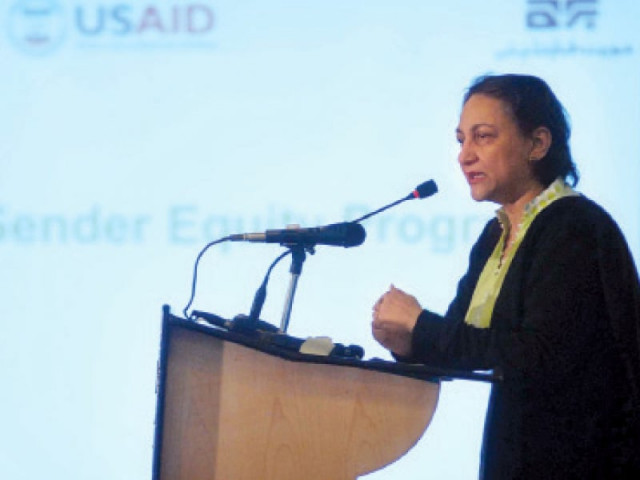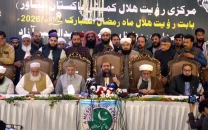Research studies: ‘Advocate women’s rights to help fight domestic violence’
Women, children and displaced persons termed vulnerable.

Seemi Kamal, from the Aurat Foundation and chief of the Gender Equity Programme addressing at the research launch in Islamabad on Monday. PHOTO: ONLINE
Domestic violence is a serious threat to the family system and can have adverse long-term effects on women and children.
This was revealed at the launch of five research studies titled “Researching Aspects of Gender-Based Violence in Pakistan”, launched by Aurat Foundation under its USAID-funded Gender Equity Programme here on Monday. The studies provide a comprehensive analysis of some key aspects of gender-based violence (GBV) in the country.
Domestic violence
The research reveals that nearly 79% of the respondents during a household survey considered physical abuse of a spouse as violence on domestic level. Approximately 71% respondents reported the spouse as the instigator of violence, often with the aid of other family members.
Meanwhile, children remained the leading cause of disputes for more than 58% of households on issues related to their disciplining, education and marriage. For 21% of respondents, economic instability and unemployment followed by division of household chores for almost same percentage.

About 45% of respondents were aware that there was a law in place for domestic violence, while 40% were concerned for the future of children who had witnessed domestic violence as children.
Recommendations for plan of action
The research suggests that there is dire need to recognise violence against women as a cross cutting theme amongst all government sectors. Religious scholars and leaders were also asked to play their part in advocating for women’s rights rather than further suppressing them. Media campaigns should question prevalent patterns of violence against women that are accepted by the society. Capacity building of police, healthcare providers and sensitisation of judiciary were other suggestions.
Sexual harassment
The study says that victims of sexual harassment are usually females with perpetrators mostly being males. It says that 33% respondents faced harassment at their workplace in Peshawar, 3% in Karachi and 13% in Islamabad. Around 94% men in Karachi and 91% in Islamabad had heard about sexual harassment incidents at workplace other than their own.
Key findings of the report state that law-enforcement agencies are not trained to handle sexual harassment cases, while lack of awareness among general masses regarding lodging FIR among others also exists.
Social and legal responses to rape
Around 61% females and 39% males said that rape is either “common” or “very common” in the country. About 24% minor girls, 22% unmarried girls, 12% minor boys, 12% married women and 3% female servants are most vulnerable to rape. About 57% rapist were identified as strangers, 18% close family members, 16% teachers, 16.5% classfellows and 12% family friends.

Internal trafficking of women and girls
The findings show that human trafficking is most likely to occur in areas where there is a concentration of illegal migrants or internally and externally displaced individuals owing to natural disasters or political and social conflicts.
The factors that assist internal trafficking, according to the report, include criminal intent, financial gain, poverty, illiteracy, patriarchal views and injustices imbedded in beliefs and customs in context of women.
Practices leading to violence at Faisalabad, Jacobabad, DI Khan and Quetta
This study reveals most prevalent customary practices that result in GBV in the sample districts are 29% early marriage, 29% watta satta, 11% honour-killing and 11% denial of property rights. Around 54% women are affected as a result of customary practices related to gender-based violence.
“Findings and recommendation of these studies have not only helped assess the enormity and patterns of violence prevalent in the society, but also helped design services to victims and survivors of violence”, Seemi Kamal, from the Aurat Foundation and chief of the Gender Equity Programme, said.
Published in The Express Tribune, February 26th, 2013.



















COMMENTS
Comments are moderated and generally will be posted if they are on-topic and not abusive.
For more information, please see our Comments FAQ